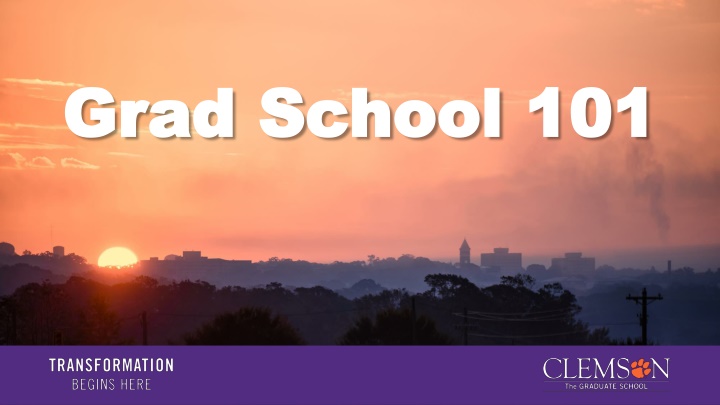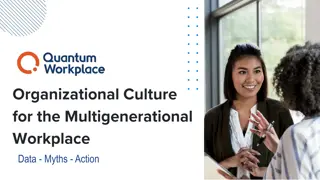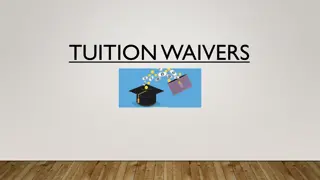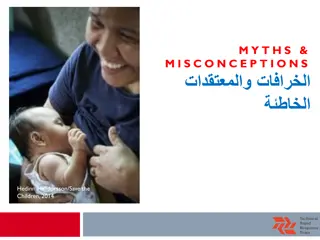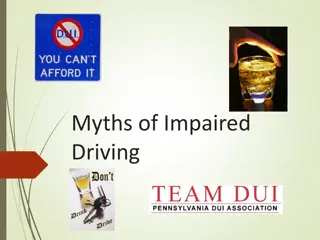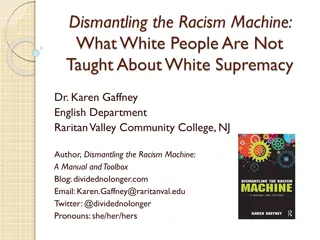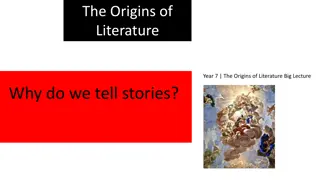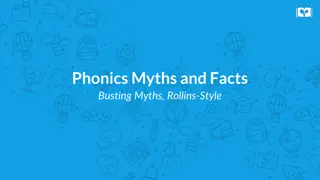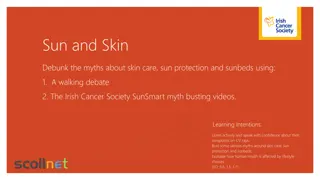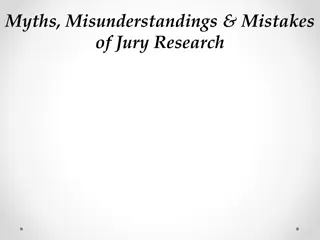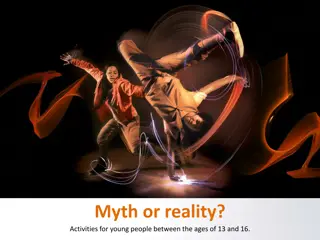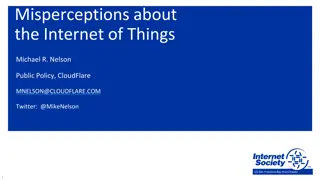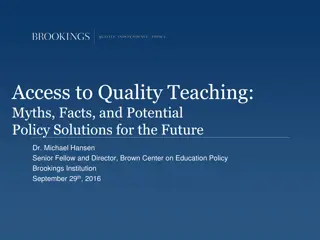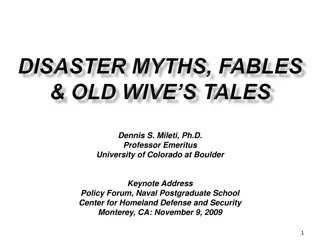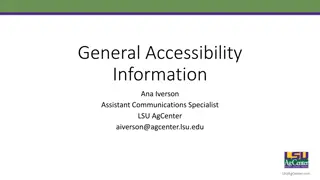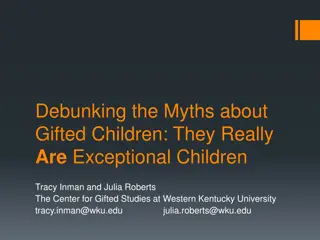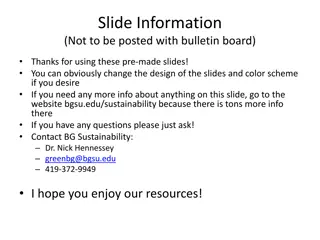Debunking Graduate School Myths: What You Need to Know
Understand the benefits of graduate school, debunk common myths surrounding it, and discover funding options and career opportunities available to you. Learn why a graduate degree can set you apart, enhance your earning potential, and provide personal satisfaction. Find out how graduate school is for individuals of various academic backgrounds, not just those with top grades.
Download Presentation

Please find below an Image/Link to download the presentation.
The content on the website is provided AS IS for your information and personal use only. It may not be sold, licensed, or shared on other websites without obtaining consent from the author.If you encounter any issues during the download, it is possible that the publisher has removed the file from their server.
You are allowed to download the files provided on this website for personal or commercial use, subject to the condition that they are used lawfully. All files are the property of their respective owners.
The content on the website is provided AS IS for your information and personal use only. It may not be sold, licensed, or shared on other websites without obtaining consent from the author.
E N D
Presentation Transcript
Grad School Grad School 101 101
Why Graduate School? Why Graduate School? Your graduate degree will Help you get ahead in the work force Set you apart from your competition in the job market Foster higher earning potential Provide personal reward and satisfaction
Graduate School Myths Let s debunk some myths. MYTH #1: It ll just cost me more money MYTH #2: It will limit my options MYTH #3: It s only for students with top grades MYTH #4: It s just more of the same
Graduate School Myths Myth 1: It ll just cost me more money You have funding options Fellowships Funded by NSF, DOE, DOD, etc. Requires excellent grades Stipend and tuition Allows you to go anywhere Assistantships Teaching Assistantship (TA) Research Assistantship (RA) Graduate Assistantship (GA) Tuition reduction and stipend
Graduate School Myths Myth 2: It will limit my options Doors open for you Lockheed Martin Sr Member Eng Stf5 years experience OR advanced degree Candidate will be a key contributor to the Human Systems and Autonomy research area within Lockheed Martin Advanced Technology Laboratories, will communicate with Lockheed Martin internal and external customers to define needs and execute on research to address these needs in both the short and long term. Work within a distributed team of scientists and engineers at ATL, other Lockheed Martin facilities, outside companies, and universities to perform research in human systems integration, human performance augmentation, and human-machine teaming, with a focus on designing and executing large-n studies of human behavior in diverse environments. Applicants are expected to have ideas for research and have a desire to see these research concepts funded. Research will focus on generating approaches that can be used to enhance Lockheed Martin s goal of enabling human- system teaming and to making leaps ahead in human-system effectiveness. R&D could take place in the areas of human-systems integration, human-robot interaction, performance monitoring, or adaptive training. Applicants selected will be subject to a government security investigation and must meet eligibility requirements for access to classified information.
Graduate School Myths Myth 3: It s only for students with top grades The ideal student is Faculty define the ideal student as: Inquisitive Hard-working Persistent Passionate Open-minded You re evaluated for potential to succeed: GRE Writing, Verbal Last few semesters demonstrated success Research/Job experience A real purpose to go to graduate school
Graduate School Myths Myth 4: It s just more of the same It s where transformation happens Graduate school can transform you: You ll become an expert in a field that you are passionate about You ll develop strong research skills You ll conduct research that makes a difference in the world You ll make connections, professional and personal
Choosing a Graduate School Do your homework Be realistic 6 10 programs Conduct in-depth research School Program Faculty
Choosing a Graduate School Understand the program Classes? Graduation requirements? How long is the program?
Communicating with a Graduate Program Start multiple dialogues Express your interest before you apply Let them know who you are Visit the program in person (if possible) Identify Faculty Do any have research interests that align with your own? Contact 1 or 2 specific faculty members Describe yourself Indicate interest in their work and why Talk to current students in the program (if possible)
Communicating with a Graduate Program Communication tips Use good judgment when establishing lines of communication Be professional Sell yourself! What do you bring to the table?
Applying to Graduate School What is needed to apply? Application Recommendations Transcripts Personal statement or statement of purpose GRE or GMAT scores English proficiency exam (international students) Curriculum Vitae (CV) TOEFL, IELTS, or PTE Interview
Applying to Graduate School Application Read ALL instructions Pay attention to the deadline Take your time
Applying to Graduate School Transcripts Official vs. Unofficial Determine what is required Major GPA vs. Overall If your major GPA is higher than your overall, it s not a bad idea to note that in your CV and interview
Applying to Graduate School Test scores GRE, GMAT, LSAT, MCAT, MAT Pay attention to what is required for your program Is there a minimum score? Preferred range? Utilize resources to prepare
Applying to Graduate School Recommendations How many are needed? Usually 2 3 Who should you ask? Ask first! Can they write a strong letter? Give them enough time Give them your CV and information about the program Remind them Thank them!
Applying to Graduate School Personal statement or statement of purpose Prepare an excellent essay Opportunity to sell yourself to the program Show that you + program = good match Follow instructions Address the questions provided Keep to page limit provided What do they want you to address? Why you want to pursue the program What are your research interests How are you a good fit for the program Address any shortcomings in your transcripts, GPA, or test scores Demonstrate good communication skills Write it yourself, but get feedback
Applying to Graduate School Curriculum vitae (academic resum ) Includes: Schools you have attended Degree or degrees you have earned Achievements you have accomplished Awards and recognitions Publications Research and work experience Organizations you were a member of Use a professional font Sell yourself!
Applying to Graduate School Interview Opportunity to set yourself apart Be prepared to talk about why you want to pursue the program, long term goals, why this school, research interests, and experiences that prepare you for the program Know the program Have questions Be yourself ! It s a conversation
Applying to Graduate School Online interview Practice by Skyping a friend Be conscious of your background Choose in a quiet place with good internet Dress for the camera
Applying to Graduate School In-person interview Shake hands Smile and mean it! Be polite Sit up straight Look at the interviewer Provide brief, direct answers Say thank you
Applying to Graduate School The interview some things to remember You will always be on You were selected to be there This is a chance to provide and get information
Preparing for Graduate School Now Experience matter Co-ops, internships Summer research Study abroad Undergraduate research experiences
Preparing for Graduate School Now Assess your strengths/weaknesses Improve your record courses research communication skills social skills Establish a group of mentors to provide feedback to give advice to write letters of recommendation
Preparing for Graduate School Now Think about your goals Meet with your advisor Get involved Utilize resources Build relationships
Consider Clemson! Consider Clemson!
Consider Clemson! Carnegie Tier 1 Research University More than 140 graduate programs Our graduate students consistently rate Clemson faculty as excellent Clemson offers a growing, inclusive and vibrant graduate student community
Consider Clemson! Ranked in the top ten in the nation for: Students love their university (#1) Safest campus (#1) Best career services (#2) Alumni give back to the university (#3) Supercomputing power at universities (#4) Outstanding town-gown relations (#6) Happiest students (#7)
